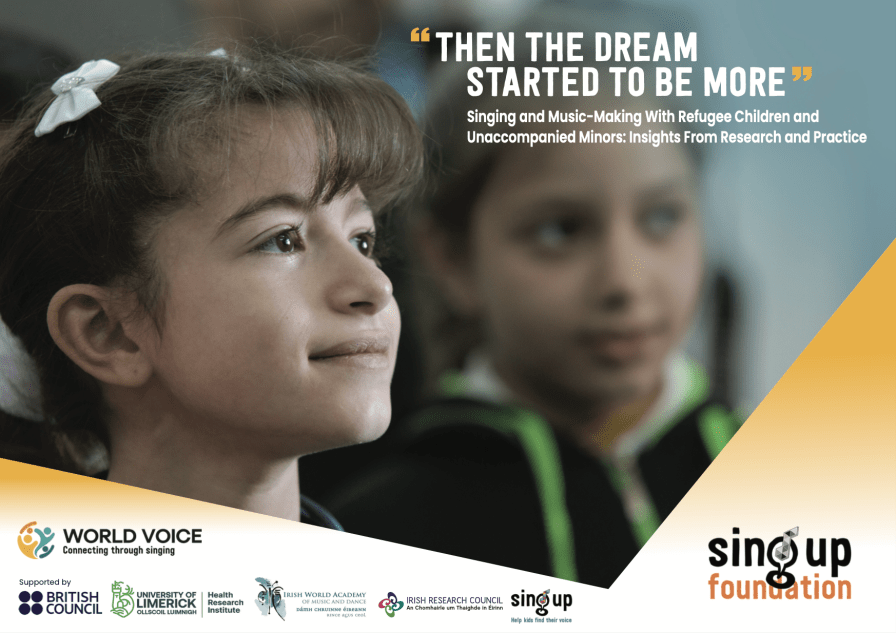New Report Highlights Potential of Singing to Impact on Wellbeing of Young Refugees

Sing Up Foundation is today publishing a new report titled: ‘Then the dream started to be more’: Singing and Music-Making with Refugee Children and Unaccompanied Minors: Insights From Research and Practice. This report is a literature review, thematic analysis of interviews and collection of case studies commissioned by Sing Up Foundation from a team led by Dr Hala Jaber with Dr Fran Garry and Professor Helen Phelan from the University of Limerick’s Irish World Academy of Music and Dance. This thorough report carefully considers the very challenging lives of refugee children and unaccompanied minors whilst highlighting the impact of singing and music-making and makes recommendations which have been used to create a three-year project to further grow this work. The report is available for download from the Sing Up Foundation website.
Alongside learnings from an extensive literature review, the researchers conducted interviews with several organisations working in this field including Fairbeats, Music Action International, Surrey Arts, Together Productions and international partners working in refugee camps that had been involved with the British Council’s World Voice project. From these interviews, a picture emerged of the challenges of this work, the need for facilitators to be well-trained and supported, the importance of carefully curated safe musical spaces and the great outcomes that this work can bring about in the lives of these very vulnerable young people.
In terms of the benefits of singing and music-making, the literature review found that this activity has the potential to support many activities that can influence a young refugees’ life such as supporting social cohesion and language acquisition. The interviews further established the ability for these singing and music-making sessions to support the children’s mental health and wellbeing by supporting them to feel free, be part of something, feel valued, feel safe and create outlets for their energy.
The report also explores the wide-ranging circumstances and contexts of the lives of these young refugees, which can range from living in camps in unsafe and unstable conditions, to seeking asylum and living in more protected environments but still under a cloud of uncertainty, to having full refugee status with access to education, housing and a full range of support. All of these external circumstances can have an effect on these young children’s lives and their ability to access and engage with music-making activity. Given these contexts, the report highlights the need for music leaders and facilitators to have appropriate training to deliver these sessions and to have psychological support to deal with and manage the effect that working in these environments can have on their own lives.
Notably, the title of the report comes directly from a quote from a participant and as the report concludes, “For many people caught up in the realities of living as a refugee, daily survival requires high levels of engagement and energy. Finding space to be creative and expressive within this context helps connect memories of the past with the ability to imagine a future, to move beyond the momentary to the possible. As one participant noted: ‘Then the dream started to be more’.”
Building upon the report and its learnings, the Sing Up Foundation has developed a longitudinal three-year action research project with Surrey Arts that will make major strides in building and disseminating a model for vocal work with young refugees and unaccompanied minors in the UK and beyond and are currently seeking funds to support the project. This project will also aim to create training and resources, an evaluation toolkit to support music organisations in their work, a network to connect facilitators and research featuring the voices of the children themselves.
Extract and recommendations from the report
‘With all the complexities and contexts within which singing and music-making occur in this research, no singular approach can be identified as ‘best’. Best practice, in this context, is presented as what people and publications have identified as most effective, viable, ethical and enriching.
Four key recommendations to support best practice extrapolated from this work include:
- The need for appropriate training and resources to support those working with refugee and migrant young people.
- Informed and considered creation of the music space/workshop.
- Psychological support for facilitators.
- Support and resources for evaluation and research.
Three key recommendations for further research include:
- The inclusion of children’s voices in longitudinal research.
- The development of a user-friendly evaluation framework for organisations.
- Supporting the development of networks and interdisciplinary partnerships for further research, training and capacity building.’
The report also determines that “Building an evidence base for best practice in music and singing programmes for refugee children and unaccompanied minors is essential to ethical, sustainable and creative delivery. This report offers an insight into current and best practice and a springboard into future, shared work and research.”
For more information and to download the report, visit: https://www.singupfoundation.org/exploring-effective-practice/singing-with-young-refugees
Researchers can also have full free access to the summaries and data used in the literature review, all available to access on the Sing Up Foundation website.

